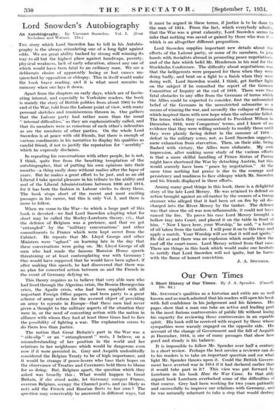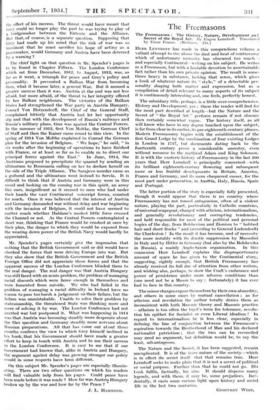Our Own Times
A Short History of Our Times. By J. A. Spender. (Cassell. - 10s. 6d.) Mn. SPENDER'S qualities as a historian and critic are so well known and so much admired that his readers will open his book with full confidence in his judgement and his fairness. His pages show that a man can take an active and leading part in the most furious controversies of public life without losing his capacity for reviewing those controversies in an equable spirit. His book will be received with respect by those whose sympathies were warmly engaged on the opposite side. His account of the change of Government and the fall of Asquith in December, 1916, is one of many passages that show how good and steady is his balance.
It is impossible to follow Mr. Spender over half it century in a short review. Perhaps the best service a reviewer can do to his readers is to take an important question and see what light Mr. Spender throws upon it. Could the British Govern- ment have averted war in 1914 if it had declared earlier that it would take part in it? This view was put forward by Loreburn in his book How the War Came. In that ably argued book Loreburn overlooked some of the difficulties of that course. Grey had been working for two years patiently and successfully to improve our relations with Germany, and he was naturally reluctant to take a step that would destroy the effect of his success. The threat would have meant that Grey could no longer play the part he was trying to play of a bridgeinaker between the Entente and the Alliance. But that, of course, is a separate question. Supposing that Grey had made up his mind that the risk of war was so imminent that he must sacrifice his hope of acting as a peacemaker, would Germany and Austria have been deterred by a warning ?
The chief light on that question in Mr. Spender's pages is to be found in Chapter Fifteen. The London Conference which sat from December, 1912, to August, 1913, was, so far as it went, a triumph for peace and Grey's policy and personality. It prevented a Balkan War from becoming then, what it became later, a general War. But it seemed a greater success than it was. Austria at the end was not less afraid, but more afraid, of the threat to her integrity offered by her Balkan neighbours. The victories of the Balkan States had strengthened the War party in Austria Hungary. Conrad Von Hotzendorff, the Chief of the General Staff, complained bitterly that Austria had let her opportunity slip and that with the development of Russia's railways and Russia's military plans, time was against the Central Powers. In the summer of 1913, first Von Moltke, the German Chief of Staff and then the Kaiser came round to this view. In the spring of 1914 Von Moltke explained to Conrad the German plan for the invasion of Belgium. "We hope," he said, "in six weeks after the beginning of operations to have finished with France, or at least so far as to enable us to direct our principal forces against the East." In June, 1914, the Austrians proposed to precipitate the quarrel by sending an ultimatum to Roumania calling on her to declare herself on the side of the Triple Alliance. The Sarajevo murder came as a godsend and the ultimatum went instead to Servia. It is difficult to think that if Austria and Germany were in this mood and looking on the coming war in this spirit, an army like ours, insignificant as it seemed to men who had under their hands the vast Continental conscript forces, counted for much. Once it was believed that the interest of Austria and Germany demanded war without delay and war beginning with the invasion of Belgium, it could not have seemed to matter much whether Haldane's modest little force crossed the Channel or not. As the Central Powers contemplated a short war, thinking that France would be crushed at once by their plan, the danger to which they would be exposed from the wearing down power of the British Navy would hardly be appreciated. •
Mr. Spender's pages certainly give the impression that nothing that the British Government said or did would have checked the forces that were driving Europe into war. But they also show that the British Government and the British Foreign Office did not appreciate those forces and that the apparent success of the London Conference blinded them to the real danger. The real danger was that Austria Hungary was still faced with an acute problem, the problem of managing racial discords which were fierce enough in themselves and were fomented from outside. We who had failed in the problem of managing a racial difficulty in. Ireland have no reason to pass too harsh a judgement on their failure, but the failure was unmistakable. Unable to solve their problem by statesmanship, the threatened State was thinking more and more of solving it by war. The London Conference had not averted war but postponed it. What was happening in 1914 was that Austria was becoming steadily more desperate about the Slav question and Germany steadily more nervous about Russian preparations. All that has come out stout those months confirms the view to which Grey himself inclined in his book, that his Government should have made a greater effort to keep in touch with Austria and to use their slICCesS in the London Conference. It is easy to see that if our Govermnent had known that, alike in Austria and Hungary, the argument against delay was growing stronger our policy would in some respects have been different.
On this subject Mr. Spender's pages are especially illumin- ating. There are two other questions on which his readers will find valuable help from his pages. Could peace have been made before it was made ? How far was Austria Hungary broken up by the war and how far by the Peace ?
J. L. HAMMOND.







































 Previous page
Previous page